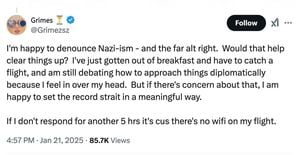France’s new immigration policy has taken a significant turn under the leadership of Minister of the Interior Bruno Retailleau, who recently issued directives tightening the rules surrounding the regularization of undocumented workers. This new circular, unveiled to regional prefects on January 23, 2023, departs from the softer stance embodied in the previous Valls circular from 2012.
Retailleau’s approach emphasizes the notion of exceptional cases for undocumented foreigners seeking residence status. He articulated, "La voie d’admission exceptionnelle au séjour (AES) n’est pas la voie normale d’immigration et d’accès au séjour. Visant des étrangers en situation irrégulière, elle doit demeurer une voie exceptionnelle." This translates to the idea of making such paths exceptionally rare rather than commonplace.
The directive aligns with the government’s broader strategy of intensifying the control over immigration flows. Retailleau noted, "Le niveau d’exigence en termes d’intégration des étrangers à notre société doit être renforcé, notamment au travers de leur engagement à respecter les valeurs de la République," indicating the government’s intent to reinforce the integration conditions for immigrants.
According to the new guidelines, regional prefects are now instructed to accompany any denial of residency with measures requiring undocumented individuals to leave France. Retailleau insisted, "Il vous appartient d’assortir systématiquement le refus de séjour d’une mesure portant obligation de quitter le territoire français (OQTF)," reinforcing his firm line on immigration policy.
While the new circular does not entirely overhaul the requirements for obtaining exceptional residency status, it introduces stringent conditions on language mastery and overall residency duration. Workers must now demonstrate proficiency in French and show evidence of either diplomas or language certifications from recognized institutions. The focus on ensuring these qualifications marks a notable shift, as the previous circular was described as promoting "une politique d’immigration lucide et équilibrée."
Therefore, one impactful change includes increasing the minimum residency period for undocumented workers from five to seven years. Under the Minister's new rules, "Une durée de présence d’au moins 7 ans constitue l’un des indices d’intégration pertinent," setting stricter boundaries for residency applications.
Statistics from 2023 reveal the broader trend of immigration regularization, with 34,724 individuals receiving papers, representing only a slight 0.3% increase compared to 2022. These figures include 11,525 for work, 22,167 for family reasons, and around 1,000 under student status. The data demonstrates the importance of clear immigration pathways for various sectors of society.
With the government signaling these new shifts, many are questioning how they will affect the lives of both undocumented individuals and the future of immigration policies within France. The continuing push for tighter regulations mirrors similar movements across Europe, underpinned by rising concerns over immigration and integration. The new directives issued by Minister Retailleau signal not only the imposition of stricter controls but also the underlying challenge of balancing humanitarian concerns with national security and local integration efforts.
France is witnessing what could be viewed as the beginning of new discussions surrounding immigration; these conversations are not merely about numbers but involve deeply societal questions about ethics and humanity. Whether the tightening of regulations will achieve the intended effect of solidifying the immigration process remains to be seen. It poses significant questions, not just for policymakers but for civil rights advocates and those within the immigrant community itself.



